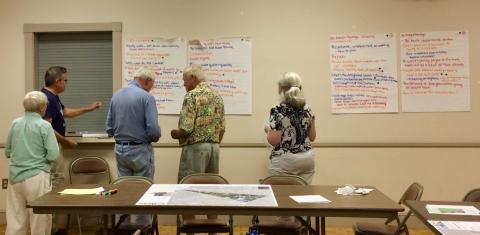Madbury Starts A Conversation On Climate

In the wake of the recent devastating hurricanes, Madbury community members came together to discuss their concerns about extreme weather and climate change and start brainstorming actions to address these challenges. Sixteen Madbury residents (some of whom are also municipal staff or board members) attended a workshop organized by UNH Cooperative Extension (UNHCE), New Hampshire Sea Grant (NHSG), and Strafford Regional Planning Commission (SRPC). It was a sweltering late September evening that felt more like July, which, while uncomfortable, emphasized the need to prepare for the changing climate. The humidity made for damp flip chart sheets, but the conditions were perfect for the ice cream social that started the evening.
The workshop is part of a project called N.H. Setting SAIL, funded in part by NOAA's Office for Coastal Management in conjunction with the N.H. Department of Environmental Services Coastal Program. The project's goal is to support implementation of recommendations from the N.H. Coastal Risk and Hazards Commission report, which identifies actions to address the state's vulnerabilities to storm surge, sea-level rise, and extreme precipitation.
Extreme precipitation will be an issue for all N.H. communities. While Madbury is largely sheltered from direct impacts of sea-level rise and storm surge, surrounding communities and important roadways for evacuation will likely be impacted and Madbury may become isolated.
Amanda Stone (UNHCE) and Lisa Graichen (UNHCE/NHSG) worked with a small planning team from Madbury to identify a community project as part of the Setting SAIL's technical assistance component. They decided to host a workshop to start a conversation about climate change and identified three topics to discuss: extreme precipitation and flooding, drought and water supply and emergency preparedness.
Participants completed two introductory activities while enjoying their ice cream sundaes. First, they used sticky dots to identify their top climate concerns, and then they added a sticky dot to a printed timeline to indicate when they moved to the community. This gave us an initial sense of who was in the room.
Next, Amanda and Lisa presented some big-picture information about climate change and its impacts on New Hampshire. Kyle Pimental from SRPC brought it down to the hyper-local level by presenting results from a recently completed vulnerability assessment for the town. Community members then shared their concerns, questions, and suggestions for actions to address flooding, drought, and emergency preparedness. The discussion was lively and productive, and many lingered after the workshop wrapped up to continue the conversation (and get a second helping of ice cream).
.jpg)
Some of the top concerns participants mentioned include:
- A lack of training for volunteers who might want to help with emergency response.
- Difficulty keeping an up-to-date list of people with medical needs and their locations.
- Challenges with emergency shelters. Madbury does not have a facility that meets the requirements of a long-term shelter, and the town could get cut off from the nearest longer-term shelter in neighboring Durham.
- Water quantity and quality: some residents' wells went dry during the drought last year.
- It's hard to plan ahead and get the necessary people and equipment in place to respond.
- Grocery stores have a limited supply duration, and Madbury could be cut off from stores located in surrounding towns.
- Some cited the recent devastation caused by Hurricane Maria in Puerto Rico and the need to have a plan for communication in case cell service is lacking.
And here are a few examples of the actions identified by the participants:
- Encourage neighbor-to-neighbor assistance during storms.
- Provide training for emergency response volunteers.
- Improve communications between the town and residents.
- Encourage the use of solar power to help serve as a back-up power source.
- Educate residents on the availability of potable water supplies.
- Implement water use restrictions during drought conditions.
- Encourage rain barrels and other methods for water conservation.
- Educate residents on impermeable surfaces and stormwater management to reduce flooding.
Amanda and Lisa are working to compile all the concerns and actions shared at the workshop and will follow up with Madbury representatives to discuss specific next steps later this fall.
